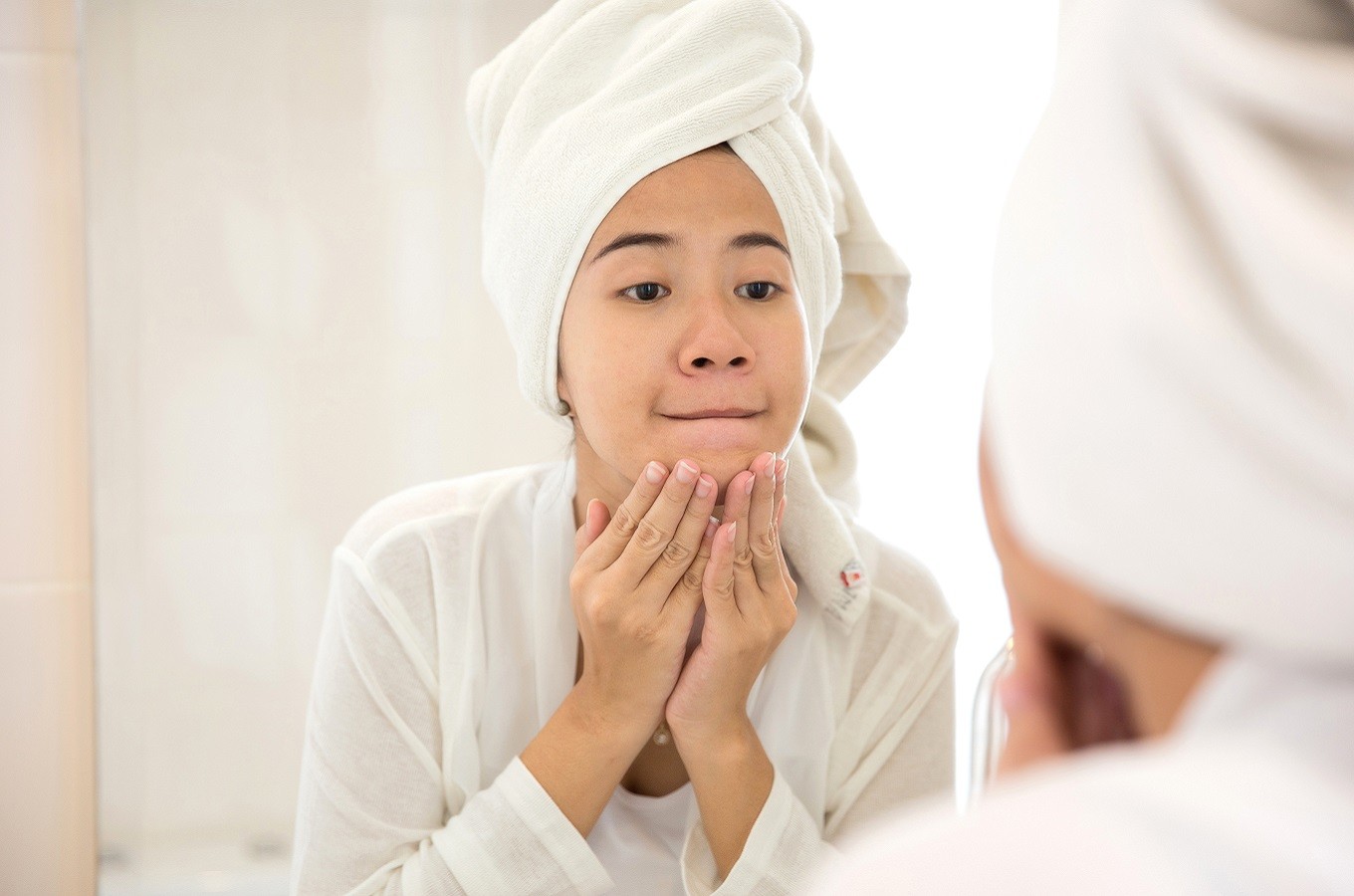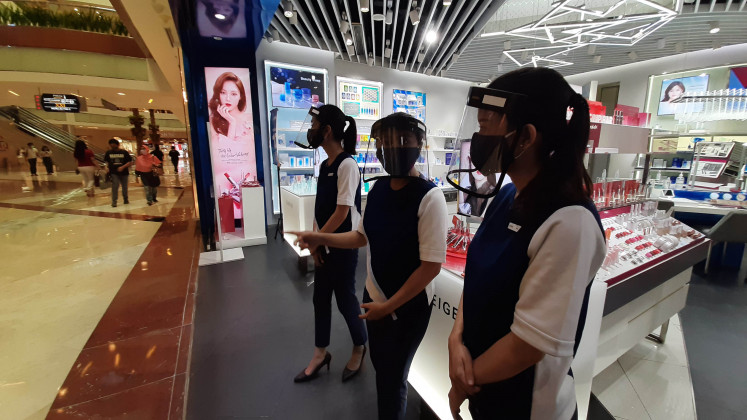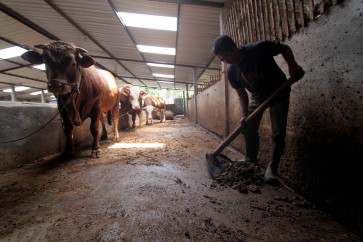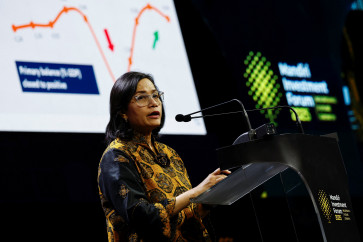Popular Reads
Top Results
Can't find what you're looking for?
View all search resultsPopular Reads
Top Results
Can't find what you're looking for?
View all search resultsIndonesia’s beauty industry sees online sales surge
While the work-from-home policy and the consumer shift to e-commerce platforms has helped boost online sales of personal care and beauty products toward recovery, brick-and-mortar retailers and salons are yet to see significant recovery growth.
Change text size
Gift Premium Articles
to Anyone
E
ver since she started working from home last April, 27-year-old Arum Purwoningrum has had more time to indulge in self-care activities, so she has spent around Rp 500,000 (US$34.7) more on buying skincare products online.
“I have smoother skin now because I have time for an eight-step skincare routine,” she told The Jakarta Post on March 23. Before, she said she used to have a five-step regimen because of limited time and low energy after her daily commute.
Arum is one of many consumers who have been spending more on self-care products because of the longer time they have been spending at home during the COVID-19 crisis. Indonesia’s beauty and personal care industry has seen demand recover on a surge in online sales ever since the government introduced the transitional phase of the large-scale social restrictions (PSBB) last June.
According to NielsenIQ’s Indonesia Beauty Report, consumer demand for face and body care products, perfumes, facial masks and hair care and styling products grew 7 percent since the transitional PSBB came into effect, while demand for cosmetics and hair color products grew 6 percent.
“We are seeing a new wave of growth among customers looking for new product developments and launches in the beauty category. Product valorization is a new trend in several personal care [products], such as serums, micellar water and hair vitamins,” NielsenIQ retail intelligence director Fairina Masud said in a press statement on March 16.
The e-commerce beauty segment continued to see double-digit growth, the report said. Meanwhile, mini markets in residential areas posted 13 percent recovery growth in the beauty segment as more customers opted to buy self-care products from stores close to home.
Read also: COVID-19 helps create new normal in online shopping: Survey
Market trends and analysis company GlobalData forecasts an 8.1 percent compound annual growth rate (CAGR) for Indonesia’s beauty and personal care industry from 2019 to 2024, when it would reach $7.6 billion.
Other than face and hair care, beauty products for the eyes also saw a rising trend.
Farina Chairunnisa, a 26-year-old research analyst, said she bought eyeliner and an eye shadow palette and looked for eyelash serums during the pandemic.
“Since I spend most of my time at home, it gives me an opportunity to practice putting on eye makeup. Also because of the mandatory mask [policy], only my eyes will be visible anyway, so why not make them prettier,” she told the Post on March 19.
According to Google’s Year in Search 2020, a report on search trends that shaped the past year released in February, online searches for “good eyelash serum” went up 200 percent. The data also showed a 240 percent rise in keyword searches for “retinol” and a 136 percent increase for “niacinamide”.
Retinol is a kind of vitamin A often used in anti-aging products while niacinamide is a form of vitamin B3 used in serums and moisturizers.
Beauty shop attendants wear face masks and shields while waiting for shoppers. (JP/Arief Suhardiman)Similarly, cofounder and chief marketing officer Chrisanti Indiana of PT Social Bella, which runs online and offline cosmetics stores under the Sociolla brand, found that sales of eyelash serums increased more than 18 times last year compared to 2019. Meanwhile, sales of products containing retinol increased almost 21 times from 2019 to 2020.
“We saw a significant increase in our online sales and organic traffic during the quarantine [period] in 2020. We also recorded the highest basket size on our online platform, Sociolla,” Chrisanti told the Post on March 18.
She also said that the cosmetics retailer expanded its offline Sociolla stores in both Indonesia and Vietnam, despite the pandemic. Foot traffic in the company’s offline stores had been picking up since the third quarter of last year, Chrisanti added, but it had yet to recover to pre-pandemic levels.
She expressed optimism for the business this year, including visits to its offline stores, “as people get used to complying with the health protocols in public spaces” amid gradual progress to economic recovery.
Read also: Sociolla opens 10 new stores in five cities
However, many Indonesian beauty product manufacturers saw their revenues decline last year as higher online sales were unable to offset lower offline sales, a visible trend across the globe.
“We estimate global beauty industry revenues could fall 20 to 30 percent in 2020,” business consultancy McKinsey & Company stated in a May 2020 industry report.
In Indonesia, publicly listed personal care product manufacturer PT Mandom Indonesia and PT Martina Berto, better known as the cosmetics and skincare giant Martha Tilaar Group, saw their annual revenues for 2020 decline respectively 44.72 percent and 29.4 percent. Only body and hair care product manufacturer PT Victoria Care Indonesia recorded an increase in revenue, at 31.1 percent.
Brick-and-mortar beauty parlors experience a downward trend during the pandemic. Jakarta-based Bloem Wax and Lash Salon saw a 54 percent decline in sales on an annual basis from 2019, with the first sharp decline recorded at the onset of the health emergency in March 2020.
Bloem salon co-owner Ruby Harumiputri said the business saw a slight uptick in customer numbers after the Idul Fitri holiday last June, but it had yet to see a significant and lasting increase in sales.
“Because our business was hit quite hard by the pandemic, we decided to add another revenue stream by selling at-home waxing kits,” she told the Post on March 23, and that the new product line had “received positive responses”.
Ruby said that since the vaccination rollout, some customers were showing an interest in resuming their visits to the salon. However, the inconsistent implementation of the COVID-19 restriction policies had made it difficult to make business decisions.
“We hope that there will be even more clarity on the broader public activity restrictions [PPKM] and acceleration of the mass vaccination [program], so consumers can regain confidence in resuming their activities,” she added.











